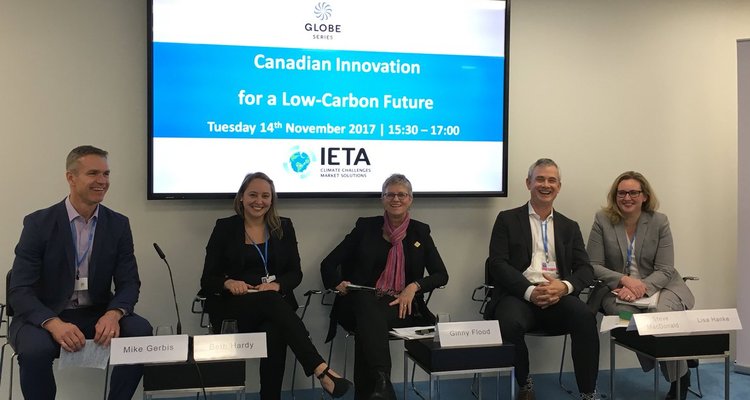Hello from COP23 and Bonn! I am delighted to be representing the International CCS Knowledge Centre for the full two weeks of the conference – though Fiji would be a little less chilly.
I was honoured to take part in a panel of Canadian innovation leaders: Canadian Innovation for a Low-Carbon Future. It cannot be stressed enough that the importance of fully deploying a technology is as significant as finding new solutions to global CO2 emissions. Throughout the COP it was said, and repeated by many speakers and participants, that without large-scale deployment of CCS, realizing a low emission pathway is unlikely and more expensive. We have heard and believe that the path forward includes working with technologies already available in our toolkit, like CCS. I heard David Hawkins astutely state that we can’t solve the climate problem by shifting from coal to gas. Clean coal is one tool in the climate toolkit and Boundary Dam was a pioneer in that regard.
I was also very happy to hear that the negotiations around Article 6 of the Paris Agreement were, with some bumps on the road, moving in the right direction. Of particular interest, the parties are moving forward on the matter of Internationally Transferred Mitigation Outcome (ITMOs). The discussions will clarify the details of the distribution and accounting of greenhouse gas emissions in a transparent fashion. I am looking forward to the new text as it will offer a great opportunity for low-carbon technologies, like CCS, to be spread around the world, from know-how locations to in-need locations.
CCS technology has allowed for diverse energy portfolios to maximize renewable energies - they are complimentary and can co-exist. Moreover, in the industrial sector, CCS is the only solution that can decarbonize cements and metallurgic plants for example.
During the first week of the event it was evident that the audience is embracing CCS technology compared to previous events – this is encouraging as the world’s climate targets cannot be met without CCS. Mike Monea and I were so pleased to have met with Deputy Director General Sun of China’s NDRC, and to hear him speak on how China can use CCUS. He emphasized the importance of international cooperation.
This week, the COP received important government-led inputs and with it, new discussions and debates from all sectors and organizations who want to mitigate global warming. The Global CCS Institute hosted reputable CCS panels on Canadian CCS and CCS policy. Our Vice-Chair, Dr. Graham Winkelman, emphasized the value that the lessons learned from Boundary Dam can apply to other industries. The message that CCS costs too much is quickly fading as costs are not the issue, but it is policy and priorities.
This was indeed a CCS friendly COP and our Knowledge Centre made many valuable connections to continue to advance a path forward to accelerated deployment.


-cropped-cropped.jpg)